Global Future Cities podcast, Episode 3. Aligning local efforts to SDGs in Malaysia
The final installment of the Global Future Cities podcast addresses the role of city authorities and donors in sustainable urban development. The episode’s two guests are both based in Malaysia: Carol Koh is a Prosperity Future Cities Adviser with the UK Foreign Commonwealth and Development Office (UK FCDO), and Kamisah Mohd Ghazali is the Senior Vice President with the Iskandar Regional Development Authority (IRDA). Koh and Ghazali build on connections referenced in the first two episodes, discussing the need for collaborative relationships between donors, delivery partners and government agencies. Both stress the effectiveness of participatory workshops, in which members of the public (and, in particular, vulnerable groups) have had the opportunity to influence the realisation of sustainable urban development. The speakers also use clear examples from their cities to lay out the effectiveness of the SDG Project Assessment Tool, which has been used to engage the public, increase financial feasibility and improve sustainability compliance throughout the programme’s implementation.
Further information and in-depth learnings from the Global Future Cities Programme’s experience are available in the two Programme's Narrative Reports “Partnering for Transformative SDG-Oriented Urban Development: Guidance for Multi-Partner Initiatives from the Global Future Cities Programme” and “Integrating the SDGs in Urban Project Design: Recommendations from the Global Future Cities Programme”.
Below is the transcript of the podcast. Please listen to the podcast here.
Hello and welcome to the Global Future Cities podcast brought to you by UN-Habitat for a better urban future. My name is Gregory Scruggs, and I will be your host for this three-part podcast that will take you inside the Global Future Cities Programme, a project by the United Nations Human Settlements Programme or UN-Habitat, and the United Kingdom's Foreign, Commonwealth and Development Office or UK FCDO. This multi-year collaboration seeks to better align the delivery of urban infrastructure projects in middle-income countries with the Sustainable Development Goals. For the unfamiliar, the Sustainable Development Goals, also known as the SDGs or the Global Goals, are a set of 17 aspirations agreed upon by all 193 member states of the United Nations back in 2015. These ambitious goals call for countries to work toward ending poverty and hunger, providing universal health care and education, slowing climate change, and ensuring gender equality, among other important objectives for a sustainable planet, all by 2030. Six years into this agenda, the clock is ticking. And here at UN-Habitat, we believe that cities, home to a majority of the world's population, are essential to delivering on the promise of the global goals.
In the Global Future Cities Programme, private sector companies from some of the world's top urban planning and design firms have been working hard to deliver 31 projects across 10 countries. Their clients, in turn, are local governments who are on the front lines of delivering sustainable development in their communities. Such public private partnership is nothing new in the world of urban development, but the Global Future Cities Programme aims to interrupt business as usual by bringing the 17 Sustainable Development Goals into the conversation. How can the SDGs change urban projects for the better? That's the subject of our conversations here on the Global Future Cities podcast.
Today, we are joined by two guests: Carol Koh is a Prosperity Future Cities Adviser with the UK FCDO, based in Kuala Lumpur, Malaysia. Kamisah Mohd Ghazali is a Senior Vice President with the Iskandar Regional Development Authority (IRDA) also in Malaysia. Carol, Kamisah - welcome to the Global Future Cities podcast.
Greg: Carol, please describe your background and your role in the project. What is your relationship on the ground to these projects?
 |
Carol: I'm based in Malaysia as a UK FCDO Program Adviser for the Global Future Cities, and I have been with the program since its early days in 2018. The program in Malaysia is working with two cities to deliver smart mobility and urban projects in Iskandar Malaysia and Melaka City. My role includes managing the program, working with delivery partners and city partners. And it's my priority to support the realisation of benefits or outcomes required by the program. And, of course, ensuring those outcomes meet the requirements of our city partners as well. |
Greg: And Kamisah, could you please introduce Iskandar Regional Development Authority for the unfamiliar?
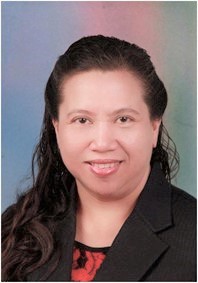 |
Kamisah: Thank you, Greg. We are Iskandar Regional Development Authority (IRDA). Iskandar Malaysia is established in 2006. It is an economic development corridor in the southern part of Johor in Malaysia, strategically located at the crossroad of the East-West trade lanes and centrally located in the heart of East Asia. Iskandar Malaysia comprises of an area of 2,217 km2 and is a statutory body, and recently, in 2019, the Federal Government has extended the development area to 4,749 km2. Iskandar Malaysia also has been recognised by the CDP Global Ranking Cities in 2019 and 2020 due to our leadership and transparency on climate action, especially in our effort to reduce greenhouse gas emission and building resilience against the impact of climate change. IRDA, as an authority, we have the role to plan, promote, and facilitate the development of Iskandar Malaysia. |
Greg: Wonderful. So, Iskandar’s project in the Global Future Cities Programme was an Implementation Strategy for your Smart Integrated Mobility Management System (SIMMS). Kamisah, what prompted the IRDA to pursue this project when it joined the program? Is the traffic jam quite terrible in the Iskandar region? Do you struggle to run public transport on time?
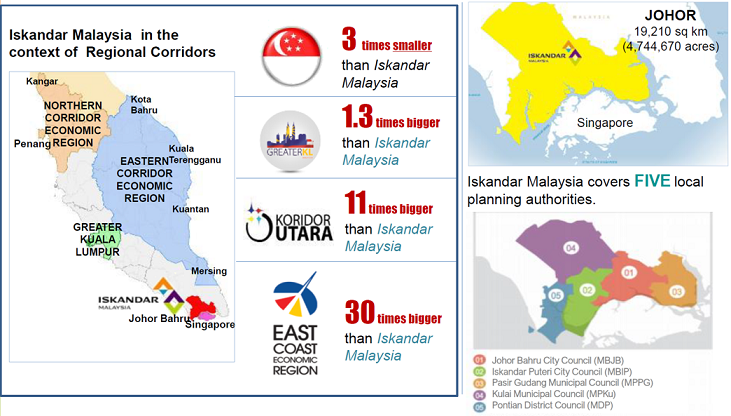
Iskandar Malaysia position in region
Kamisah: Iskandar Malaysia is developing quite rapidly, so we know for a fact that an efficient transportation system is key economic enabler that is essential to support and foster development of Iskandar Malaysia. Therefore, the experience was, as we move into more rapid development, we can see there are a lot of challenges. For instance, poor public transport infrastructure and the service pattern, because we are relying only on bus services and also taxi services, that was all that is available within the Iskandar region. We need a mass transit system that can accommodate for newly developed area and high-density population. There is a need for coordination and in our transportation blueprint, we look at how information can reach the public when it comes to transportation system. We took the opportunity because funding has always been an issue; it was the major reason why we pitch for the UK Prosperity Fund, to enter the Global Future Cities Programme to start or kick start, something in relation to that. And that's how we started the project.
Greg: That's a good time to bring Carol back into the conversation. As I understand it, the firm in question that worked with Iskandar, is Mott MacDonald. Carol, can you describe the role of UK FCDO in brokering this relationship and how the Prosperity Fund views the importance of improving mobility in places as Iskandar economic corridor?
Carol: Mott MacDonald has been appointed to deliver the projects in Iskandar, as well as the other projects in Southeast Asia region for the Programme. With the Iskandar project, from a broader perspective with the Program, we certainly hope this project will bring two benefits for Iskandar Malaysia, especially looking at how the system will help increase mobility with support of technology and data, and to create safer urban environments that would enhance inclusive economic growth, and to reduce poverty and gender inequality, which are the key Programme objectives aligned to SDGs. And I believe well aligned to Iskandar Malaysia's vision as well.
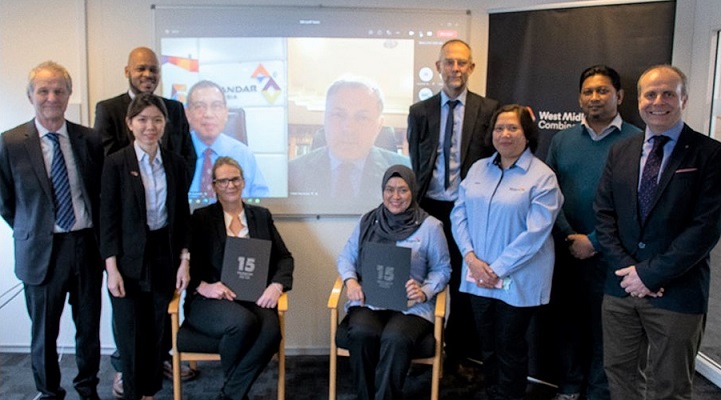
Carol (standing left) and Kamisah (standing right) during the signing of a Memorandum of Understanding between IRDA and Transport for West Midlands (TfWM), the West Midlands Combined Authority, UK
Greg: Kamisah, prior to participating in the Global Future Cities Programme, how, if at all, did the SDGs factor into tenders when the Iskandar Regional Development Authority solicits bids for urban projects like the one you just did with Mott MacDonald?
Kamisah: Well, I think prior to SDGs, I would say that it's all embedded into the terms of reference (ToR) of the various projects. But of course, prior to SDGs, we focused more on the Millennium Development Goals (MDGs), and mainly looking at environmental sustainability aspect of it. We are also guided by our Comprehensive Development Plan documents, where circle of sustainability, that look at the economy, social and environment, is an integral part of the whole development, and we are also guided by our Low Carbon Society. So, prior to SDGs, all those were embedded in some way, in our ToR, when we solicited bids for urban projects. But now, that we are also going into localising SDGs, all our projects one way or another will have to look at aspects, especially on Gender Equality and Social Inclusion (GESI). And, depending on what type of projects, then we will actually embed some of the SD Goals in the documents.
Greg: Speaking of tools, one of the key innovations of the Global Future Cities Programme was the SDG Project Assessment Tool, an analytical device that measured these projects against the SDGs and then facilitated workshops with both the public and private sector to work through ways of improving the projects so that they were ultimately more in line with the SDGs. Carol, could you tell us more about the SDG Tool? How did the Tool work in practice and what was its effect on the ground?
Carol: The SDG Tool is more than an assessment tool, but it's also a very effective engagement tool based on our experience, using it in bringing various parties together, including our city partners for reflections and to discuss issues at a strategic level. So, in the assessment workshops, we come together as a group to discuss what can be done to fulfil the SDG criteria that were preselected for the project. So as an example, for the Iskandar Malaysia project, we have jointly selected about 54 criteria that contributes directly to 11 out of the 17 SDGs. During the workshops, it involves asking ourselves questions, like on financing – what we can do to increase the bankability of projects, or on inclusivity – are we leaving anyone behind; who else needs to be engaged, and so on. And some of the actions we discuss are not necessarily a responsibility of the delivery partner, but cities are encouraged to take ownership as well. So, the process and the workshops are very helpful for that purpose. And ultimately, it's to ensure that the projects can be sustainable and would benefit the community and the city in the long term.
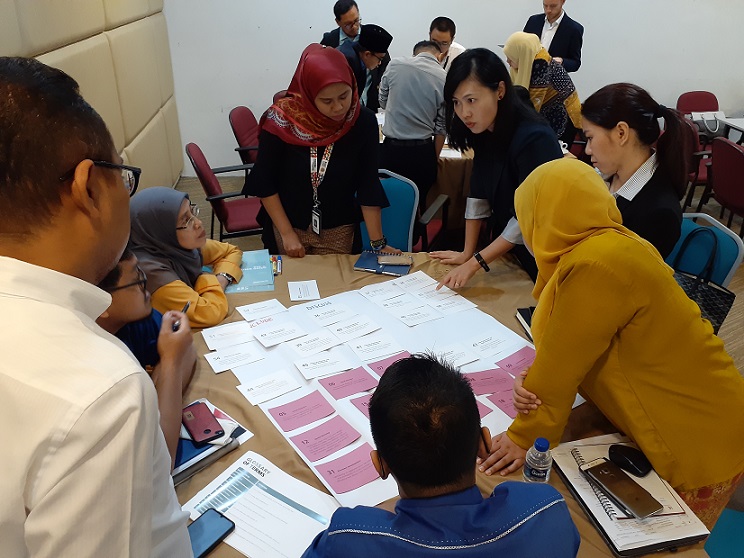
Iskandar Malaysia SDG Tool assessment workshop on smart mobility
Greg: Earlier you mentioned the Gender Equality and Social Inclusion, or GESI, consultancy group. Were there any specific recommendations that came out of the consultations?
Carol: In terms of engagement with the consultative group, they have been involved in our monthly technical committee meetings, as well as separate specific focus groups to discuss general issues in mobility and to discuss their needs in terms of mobility. I would say that they have been very supportive as well, and the feedback that I've gotten from the group is that they are very appreciative of having this platform to engage and to communicate with authorities through the Programme and ultimately to also input into the design of these projects. So that have been very, very helpful. And I must commend IRDA’s efforts as well in helping to fulfil the Programme objectives in addressing gender inequality issues, one by setting up the Gender Equality and Social Inclusion Group. And I understand the aspirations from IRDA is also to continue engagements with the group in the future to input into some of the other development projects. To mention as well on the Programme, we have provided a series of GESI awareness training to the group, understanding that they are members of the civil society and may not necessarily understand the concepts of gender equality and inclusion. So, through those training, we provide them an overview of the concepts, examples, and case studies as well, especially those related to urban mobility. They went very well, and we have received lots of positive feedbacks, and our hope is really to see that this group will continue to be engaged as well beyond the program.
Greg: Could you give a specific example of a type of concern around mobility issues that they raised in these consultations, even if it's not yet at the full implementation phase?
Carol: To share an example, one of the group members, is actually a wheelchair user and through the focus group sessions, he has mentioned that he has faced problems in accessing some of the shops in the city, because there isn't a proper pavement for wheelchairs. And because of that feedback, our Delivery Partner actually developed an application to collect data on facilities for disabled users. So that application hopefully will be developed into something that can directly input into SIMMS, which is the Smart Integrated Mobility Management System. And through all that data that we cross-sourced from the community, specifically from the marginalized community, will hopefully help to make policy decisions as well through the broader SIMM system.
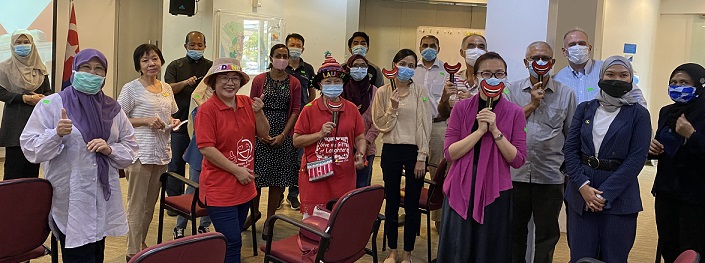
Iskandar Malaysia focus group meeting
Greg: Kamisah, did accounting for SDG impacts on project delivery change any aspects of the implementation strategy for SIMMS, as you refer to it, the Smart Integrated Mobility Management System. What impact did, going through the SDG Tool, ultimately have on your private sector delivery partner? How did Mott MacDonald respond to the requested adjustments from the SDG Tool, and did it add any cost to the project or slow down the ultimate delivery?
Kamisah: I would say no, because most of these activities is already embedded or is already part of the requirement in the ToR. But of course, from what I can see, what I observe, the recommendation made by UN-Habitat definitely is consistent to what we need to deliver. So, I wouldn't say that it's actually have that much impact, whether it's cause, whether it's delivery time and Mott MacDonald are very responsive to the requested adjustment, I would say.
Greg: Now going forward, Kamisah, if the Iskandar Regional Development Authority will require private sector partners bidding on projects to pursue some variation of the SDG Tool, what adjustments will be required to your internal systems around tenders or requests for proposals going forward?
Kamisah: So far, I think it's very straightforward in a lot of our tender requirement, tender process, it's the response is based on the ToR. So, if we actually insist or require them to actually adopt the SDG Assessment Tool, then we have to make it part of the Term of Reference of the project. Similar, when we have teams, into some of the infrastructure project, it was actually spelled out in the ToRs requirement, then the consultants will have to actually comply to that. Because if they don't comply to ToR, then they would not be considered, as, eligible or meeting requirements.
Greg: Carol, on that note, based on your experience with the project, do you think that private sector companies are prepared to make the necessary changes to their business practices and their methods of project execution and delivery to align their bids and work processes going forward with the SDGs in this manner?
Carol: Yes, generally I would say yes, and it really helps to have this SDG assessment process, because it provides a platform for engagements at a more strategic level, and it also reinforces the objectives of the Programme among all parties in achieving that long term impact and sustainability. Sometimes in delivering projects, especially working with private sector companies, it is very output driven as prescribed in contracts, if you could imagine. But it's so important to connect the dots at a macro strategic level to constantly adapt and to also innovatively look at synergy between different components where the longer-term opportunities usually lie. And it is just so important to keep reminding ourselves, that this is a Programme aimed at delivering impact for the community. So, the SDG Tool enables us to do this systematically just by bringing different parties together. And I suppose the scoring mechanism of the Tool has become quite an incentive as well to encourage collective actions from all parties.
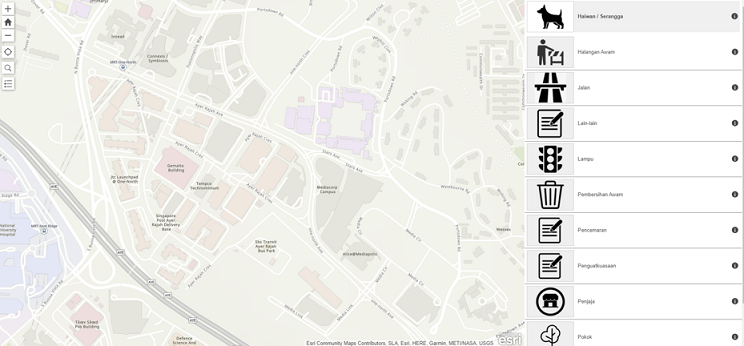
A sample snapshot of the Iskandar Malaysia Citizen Feedback Portal and list of complaint categories
Greg: Kamisah, do you feel that you have adequate support from the Malaysian national government to deliver on the SDGs? And if so, how did that support translate to this particular project?
Kamisah: I would say national government is also looking at SD Goals very seriously, because it currently being embedded in almost all the statutory documents at all levels of Government, from the federal level, state level, and also local level. And inside the document, there is a requirement for them to map the achievement and capture the gaps of what is happening now and what they need to achieve. So, all these gaps now are captured inside the statutory documents. I know some of the documents are currently being reviewed, so I feel that Federal Government strongly supports SDGs. Also, I believe, through the engagement that we have with the Federal Government agencies and ministries, we can see their support in the project and for your information our Plan Malaysia, the planning authority, is currently the party that monitor the SDG performance at all levels.
Greg: Lastly, could each of you think back to the SDG Assessment Tool workshop held for this project and describe for someone who wasn't there an “aha!” moment, a moment where a stakeholder was able to think through a challenge related to the mobility needs of the Iskandar region and draw on the SDGs as a source of inspiration?
Carol: One very memorable moment would be on capacity building. Through SDG assessments we realise the importance and the significance of it to ensure sustainability of the projects and through those discussions, I think, it really helps to review the progress periodically and to identify ways of how we can build the capacity not just within the Programme period, but beyond and in the long term. And I've always thought that human resource is just so important element in delivering projects, any type of project, not just urban and transport projects. I would say that that would be the “aha!” moment that came out from the SDG Tool as we discuss a lot about sustainability and it always goes back to the people, what can we do to build the capacity for the longer term.
Kamisah: I totally agree with Carol, but since capacity building and the people was mentioned, another aspect that I remember, is actually part of the SDG Tool looks at infrastructure requirement for GESI, in terms of transportation services, access, accessibility and all that. So that is also, to me, an important aspect in mobility, because a lot of people, a lot of agencies, authorities would develop a system, but in developing, let's say, even right now, we are developing Bus Rapid Transit (BRT) system, but the aspect on accessibility on the Non-Motorized Transport (NMT) facilities, last mile connectivity, is very important to ensure that the BRT system can be sustainable in the future to the promotion of higher ridership, and these facilities and infrastructure, the connecting facilities is important. On the last mile connectivity is important to actually attract more and more ridership. It helps project like BRT when they adopt the SDG Assessment Tool to actually assess what's missing in their planning and what's needed in their planning, because it considers a lot of aspects. Like Carol was saying, what's important is not about the system, but about how it impacts the people in Iskandar Malaysia. So that is something that I think that come to my mind, what would be the area that I really appreciate when it comes to SDG Tool.
Greg: That concludes this episode of the Global Future Cities podcast brought to you by UN-Habitat for a better urban future. I would like to thank our two guests today. We were joined once again by Carol Koh, a Prosperity Future Cities Adviser with UK FCDO, and Kamisah Mohd Ghazali, a Senior Vice President with the Iskandar Regional Development Authority. Thank you to you both.
Kamisah: Thank you, Greg.
Carol: Thank you, Greg. Thanks for having us.
The three-part Global Future Cities podcast provides listeners with an inside look at how the Global Future Cities Programme (GFCP) has facilitated the design and implementation of sustainable, multi-stakeholder urban projects across the world. Please listen and read the Episode 1 and Episode 2.
Partner
UK Foreign, Commonwealth & Development Office
Country
Malaysia
City
Iskandar Malaysia
Themes
Capacity-Building and Market Maturity
Social Inclusion
Strategy & Planning
Mobility
Data Systems
Author(s)

Gregory Scruggs
Urban Journalist, Communications Professional